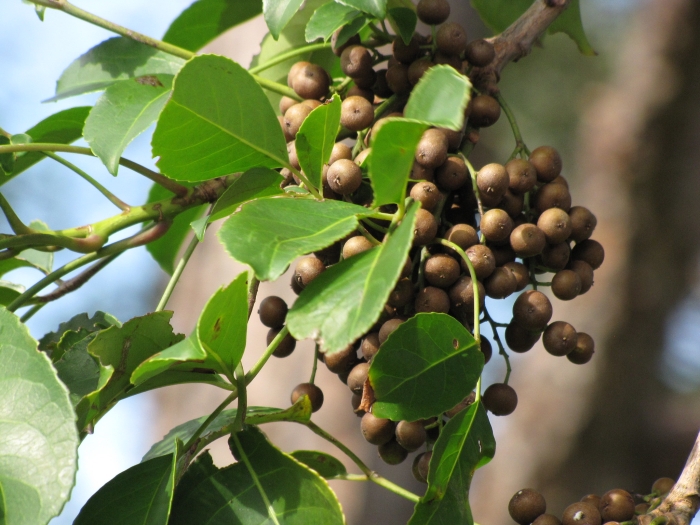Bishopwood
(Bischofia javanica)
Bishopwood (Bischofia javanica)
/
/

Forest and Kim Starr
CC BY 2.0
Image By:
Forest and Kim Starr
Recorded By:
Copyright:
CC BY 2.0
Copyright Notice:
Photo by: Forest and Kim Starr | License Type: CC BY 2.0 | License URL: https://creativecommons.org/licenses/by-sa/2.0/ | Uploader: Starr Environmental | Publisher: Flickr |
















































Estimated Native Range
Summary
Bischofia javanica, commonly known as Bishopwood, is an evergreen tree native to moist forests, riparian zones, and wetlands in South and Southeast Asia. It can grow to a height of 20-50 feet (6-15 meters) and a width of 16-20 feet (5-6 meters), with a dense, rounded canopy. The tree’s appearance is characterized by its glossy, trifoliate leaves and small, inconspicuous greenish-white flowers that bloom in the spring. The flowers are followed by small, red to black fruit that are attractive to birds. Bishopwood is known for its fast growth rate and ability to adapt to a range of soil conditions.
Bishopwood is valued for its dense shade and is often used in tropical and subtropical landscapes for urban planting, as a street tree, or for creating a natural screen. It is also utilized for its wood in furniture making. In cultivation, it requires full sun to part shade, consistent moisture, and well-draining soils. While it is relatively easy to maintain, it can be susceptible to root rot in overly wet conditions. Gardeners should be aware of its potential to become invasive outside its native range, as it can displace native vegetation and alter ecosystems.CC BY-SA 4.0
Bishopwood is valued for its dense shade and is often used in tropical and subtropical landscapes for urban planting, as a street tree, or for creating a natural screen. It is also utilized for its wood in furniture making. In cultivation, it requires full sun to part shade, consistent moisture, and well-draining soils. While it is relatively easy to maintain, it can be susceptible to root rot in overly wet conditions. Gardeners should be aware of its potential to become invasive outside its native range, as it can displace native vegetation and alter ecosystems.CC BY-SA 4.0
Plant Description
- Plant Type: Tree
- Height: 20-50 feet
- Width: 16-20 feet
- Growth Rate: Moderate
- Flower Color: N/A
- Flowering Season: Spring, Summer, Fall
- Leaf Retention: Evergreen
Growth Requirements
- Sun: Full Sun, Part Shade
- Water: High
- Drainage: Medium
Common Uses
Erosion Control
Natural Habitat
Moist forests, riparian zones, and wetlands in South and Southeast Asia
Other Names
Common Names: Javanese Bishopweed, Bishop-Wood, Needlebark, Javawood, Java-Cedar, Koka, Tongotongo, Toog, Uriam
Scientific Names: , Bischofia javanica, Bischofia trifoliata, Bischofia leptopoda, Bischofia javanica var. genuina, Bischofia javanica var. oblongifolia, Microelus roeperianus, Andrachne apetala, Andrachne trifoliata, Bischofia cummingiana
GBIF Accepted Name: Bischofia javanica Blume